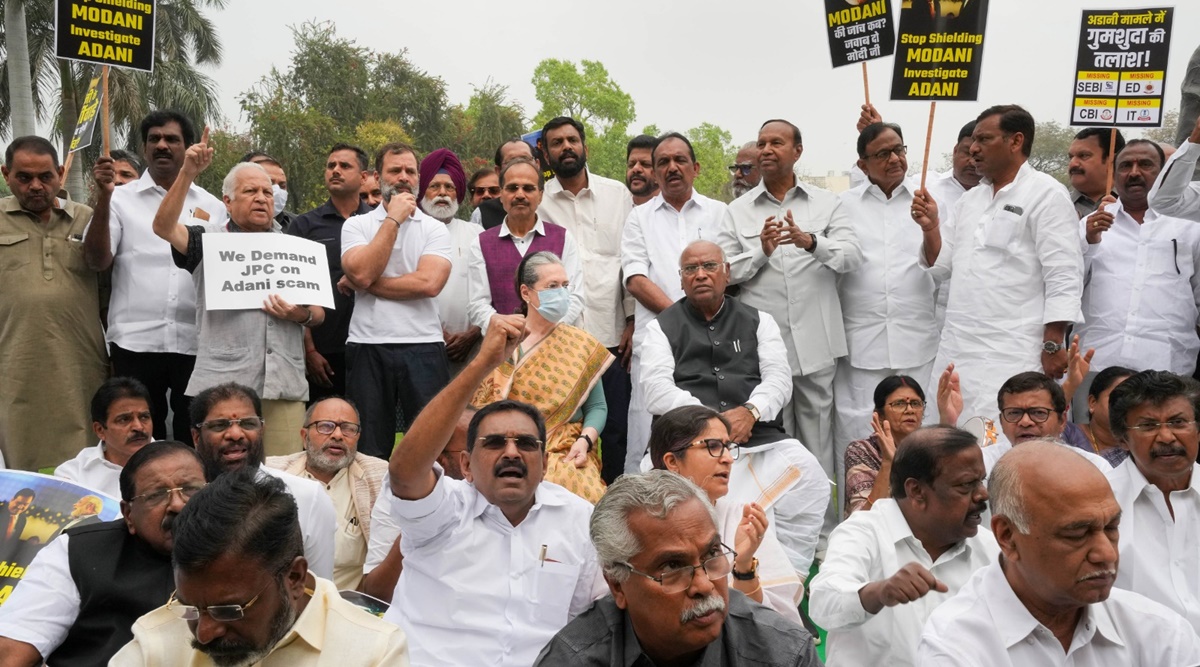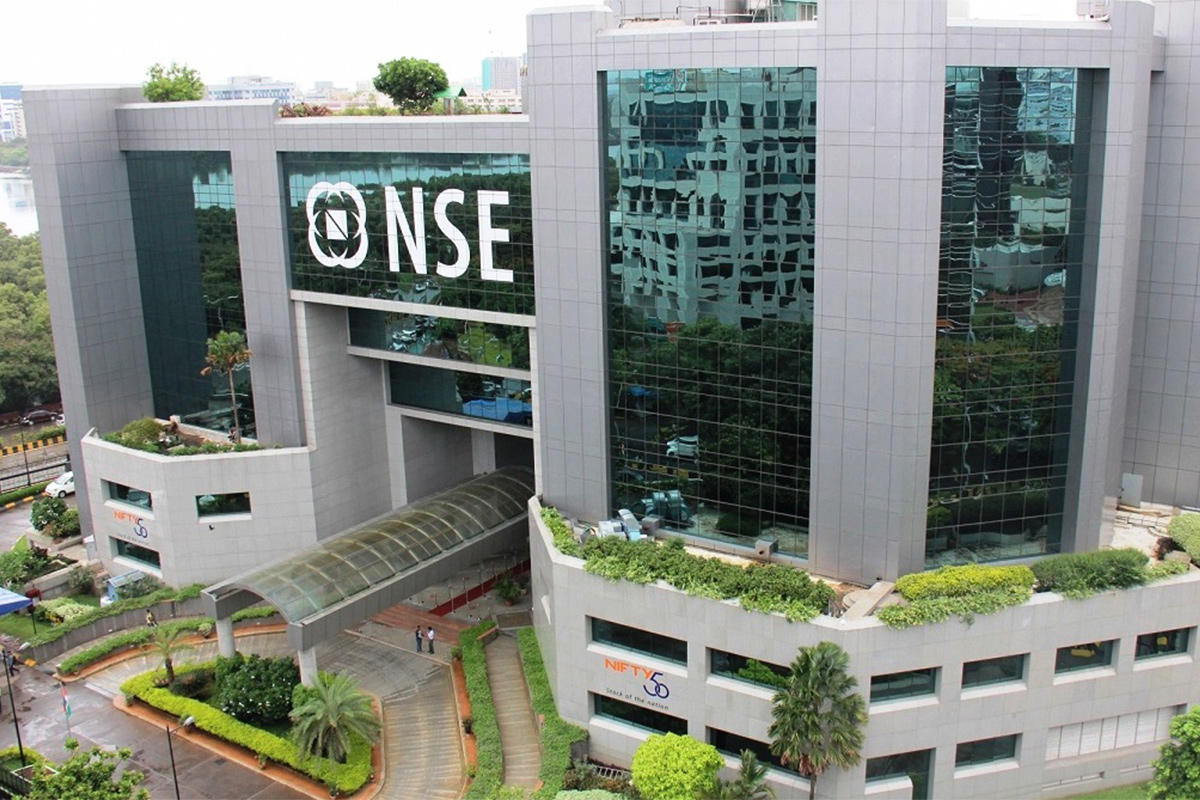Are SEBI And NSE Protecting Adani Group’s Interests? Congress Demands Transparency!
Ramesh claims that as of March 20, the NSE had five Adani Group companies included in no less than 14 indexes, even though major index providers like MSCI, S&P Dow Jones, and FTSE Russell were reviewing the placement of the Adani stocks in their equity indices. Ramesh also accused SEBI of allowing investors to take on added exposure to Adani Group stocks, despite concerns about the group's environmental and governance record.

Are SEBI & NSE Protecting Adani Group’s Interests? Congress Demands Transparency!
In recent years, the Adani Group has become one of India’s most powerful conglomerates, with interests spanning energy, infrastructure, logistics, and real estate. However, the group’s meteoric rise has not been without controversy, as questions have been raised about its environmental record and its close ties to Prime Minister Narendra Modi’s government.
The latest controversy surrounding the Adani Group centres on the SEBI and the National Stock Exchange (NSE), which have been accused of protecting the group’s interests at the expense of investors and the broader market.

Background on the Adani Group
It was in 1988 when Gautam Adani established the Adani Group, who began his career as a diamond trader before moving into the commodities business. The group’s early success came from importing and trading commodities such as coal before it expanded into power generation, ports, and other infrastructure projects.
However, the group’s rapid expansion has been accompanied by controversy. In particular, environmental groups have raised concerns about the Adani Group’s plans to develop a massive coal mine in Queensland, Australia, which they say will have devastating effects on the Great Barrier Reef and contribute to climate change.
The group has also been criticized for its close ties to Prime Minister Modi, with opposition parties alleging that the government has given the group preferential treatment in awarding contracts and providing regulatory approvals.
Congress Remarks
The latest controversy surrounding the Adani Group began when the Congress party’s Jairam Ramesh accused the NSE of lifting additional surveillance on some Adani Group company stocks.
Ramesh claims that as of March 20, the NSE had five Adani Group companies included in no less than 14 indexes, even though major index providers like MSCI, S&P Dow Jones, and FTSE Russell were reviewing the placement of the Adani stocks in their equity indices.
Ramesh also accused SEBI of allowing investors to take on added exposure to Adani Group stocks, despite concerns about the group’s environmental and governance record.
The NSE, for its part, denied the Congress party’s allegations, saying that it follows a transparent and objective process for including or excluding stocks from its indices.
The exchange also clarified that it had included the Adani Group companies in its indices based on their market capitalization and liquidity and that the companies had met the exchange’s eligibility criteria.
The NSE also noted that it had put in place additional surveillance mechanisms for some Adani Group stocks in the past but had now lifted those mechanisms based on the companies’ compliance with regulatory norms.
SEBI, meanwhile, has not commented directly on the allegations made by the Congress party. However, the regulator has emphasized that it takes a “zero-tolerance” approach to market manipulation and that it closely monitors trading activity in all listed companies.
SEBI has also said that it regularly reviews the eligibility criteria for inclusion in market indices and takes into account factors such as liquidity, market capitalization, and compliance with regulatory norms.
The SEBI is allowing investors to take on further exposure to such equities, the Congress alleged on Friday, claiming that the National Stock Exchange (NSE) has lifted additional surveillance on select Adani Group firm stocks.
The Adani stocks were being examined by major index providers, including MSCI, S&P Dow Jones, and FTSE Russell as of March 20, but the NSE took the other tack and included five Adani Group firms in at least 14 indices starting that day, according to Congress general secretary Jairam Ramesh.
According to Ramesh, the NSE declared that Adani Enterprises, Adani Power, and Adani Wilmar would cease participating in the additional surveillance mechanism framework that had been established to safeguard investors from undue risk as of Friday.
Jairam Ramesh criticized the Move.
The time must not be a coincidence, right? Why does SEBI remain silent as the NSE opts to defend the interests of the Adani Group rather than that of thousands of small investors?
The Congress leader questioned, “Why is SEBI enabling index investors to have more exposure to Adani Group stocks when financial advisors, who typically work with wealthier investors, have been telling their clients not to buy Adani Group equities?

Ramesh added that the CEO of the Bank of Baroda stated the bank would keep providing loans to the billionaire Gautam Adani-led business conglomerate almost a month after allegations of impropriety in the Adani Group emerged.
“This declaration occurred at a time when the value of Adani collateral in the form of pledged shares had dropped by more than half, triggering margin calls by significant global lenders concerned about repayment and new doubts about the group’s ability to service and repay its enormous debt,” he said.
Are the NSE and SEBI under any pressure to ease up on the Adani Group?
Ramesh claimed that market regulators like the Securities and Exchange Board of India (SEBI) had “tarnished” their reputation and cast doubt on the reliability of India’s financial markets due to their “failure” to safeguard Indian capital markets.
“You (PM) have used strong words in the past, calling on world leaders at G20 meetings to “remove safe havens for economic offenders,” “hunt down and unconditionally extradite money launderers,” and “tear down the web of complex international legislation and excessive banking secrecy that cover the corrupt and their crimes,” Ramesh wrote in a statement to the prime minister.
Ramesh criticized Modi by saying, “Yet these same international leaders cannot have missed the tremendous degree of tolerance you have shown for similar activities by your own cronies.
The allegations of fraud and manipulation made against billionaire Gautam Adani’s companies by the US-based short seller Hindenburg Research, which led to an unprecedented stock crash, have been the subject of demands from the opposition for a joint parliamentary committee probe or a Supreme Court-monitored investigation. The group has disputed the allegations.
Because the public sector LIC and SBI invested in the Adani Group shares, the opposition parties have called the collapse of those shares a “mega fraud” involving the money of ordinary people and have questioned the government’s actions. The Adani Group is facing significant accusations of “brazen stock manipulation,” according to Ramesh.
“Thousands of ordinary investors who purchased Adani Group stocks after being deceived by artificially inflated prices have suffered financial harm due to the decline in publicly traded stock prices following the release of these claims. From January 24 and February 6, 2023, the value of the Adani Group stock dropped by Rs 9,50,000 crore, according to Ramesh.
He claimed that on July 19, 2021, the Ministry of Finance “confirmed” to Parliament that there was an ongoing inquiry into possible SEBI violations at the Adani Group.
“Yet, after that, the prices of Adani Group stock were permitted to soar. When will SEBI be made to answer for this grave error and for the destruction of enormous retail savings? “Did the Modi administration put pressure on SEBI to delay its inquiry?” he questioned.
Ramesh claimed that despite the prime minister’s rhetoric about halting the flow of illegally obtained money, the prime minister’s “favourite business group” is suspected of manipulating stock prices by using related parties who pretended to be investment funds in order to get around SEBI regulations.
“The Monterosa group’s ownership of up to USD 4.5 billion (Rs 37,000 crore) worth of Adani Group stock is one of the most difficult situations. The CEO of this ostensibly independent company is said to be connected to a wanted diamond dealer whose daughter has wed Vinod Adani’s (Gautam Adani’s brother) son.
It is known that other sizable funds make practically all of their investments in Adani Group firms, which is rare for an investment fund, he asserted. According to Ramesh, the finance ministry informed Parliament that SEBI had frozen the accounts of a few funds run by the Monterosa group in 2016, but there has been no sign of any further action.
The Congress leader questioned, “What has SEBI done to adequately probe these questionable benami companies? If not, what is the Adani Group’s leverage in such a situation?”
If not, what kind of influence does the Adani Group wield that prevents the regulators and investigative authorities in India from using their full weight to uncover the truth? What was discussed in person by Gautam Adani and SEBI chair Madhabi Puri Buch in October 2022, he claimed?
Ramesh further asserted that it has become “contentious” to include Adani Enterprises in the popular National Stock Exchange (NSE) Nifty 50 index starting in September 2022.
“Its fundamentals were dubious, and it had a disproportionate price-to-earnings ratio and a little free float. The Employees Provident Fund Organisation, India’s largest pension fund, and other ostensibly conservative Nifty index funds were forced to make significant investments in this hazardous company as a result of the addition of Adani Enterprises, “Ramesh said.

As the situation is being looked into, some international stock indices have recently suspended Adani Group businesses, but the NSE, according to him, has “failed” to take any equivalent action to safeguard investors. Is it not SEBI’s duty to defend investors by enforcing tight rules? Stated Ramesh.
The Congress national secretary questioned whether the Prime Minister’s Office was exerting pressure on the NSE and SEBI to be lenient with the Adani Group in an effort to save it.
Conclusion
The controversy surrounding the Adani Group and its relationship with SEBI and the NSE highlights the need for greater transparency and accountability in India’s financial markets. It also underscores the importance of independent regulatory oversight and the need to ensure that the interests of investors are protected.
While SEBI and the NSE have defended their actions, it is important for them to address the concerns raised by the Congress party and other stakeholders. This will help to restore confidence in India’s financial markets and ensure that investors are able to make informed decisions based on accurate and reliable information.
Edited by Prakriti Arora




